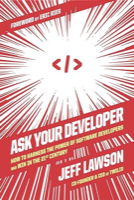Book notes: Ask Your Developer
Nov 30, 2023
By Jeff Lawson.
Unsure where I found out about this book.
Jeff is a software engineer and the CEO of Twilio, this book is to help business-types to understand and get better productivity out of their software teams.
A quick read. Good for tech book club. 50% an advertisement for Twilio.
Why developers matter more than ever
- Build vs die. An impassioned plea to build bespoke solutions instead of buying off the shelf as a competitive advantage to build what your customers actually want.
- The new software chain. Micro-services.
Understand and motivate your developers
- Hi, I’m Jeff, and I’m a developer. I was energized by his Notes4Free.com story! Background story of Twilio. Innovation is cultural. Important to have a relationship between tech and business people. Big takeaway: “Share problems, not solutions.”
- Code is creative. Requests for startups - confirms my thoughts on having a list of problems to solve. “Call for solutions.”
- Experimentation is the prerequisite to innovation. Big ideas start small. Experiment! A good experiment should 1: validate customer assumptions, 2: Lead to a big outcome. Write down your experiments. Ask your developer when to pull the plug on an experiment.
- Recruiting & hiring developers. We all seek autonomy, mastery, purpose. Bonuses aren’t that motivating.
Making your developers successful
- Create an open, learning environment. Learning how to learn, have guardrails and support.
- Open project reviews. Public grilling from Chee Chew.
- Socratic method. Public grilling from law school.
- Blameless postmortem.
- Learn by doing. Target spends 50 days for each IT staff member on learning.
- Train leaders on smaller projects.
- Small teams and single-threaded leaders. Amazon scaled its startup culture. Usually large companies lose their sense of energy. Two-pizza teams (or 2 dozen bagels). Every Twilio employee answers some customer calls and writes an app with their API.
- Customer, mission, metrics. E.g. metrics: time from code check-in to deployment, revenue, customer count, API uptime & latency, customer net-promoter score.
- Mitosis. When a team grows too big split it into 2 teams. It can take 6 months to refactor code to do this.
- Single-threaded leaders & decision-making. VPs shouldn’t interfere. Bikeshedding. RAPID decision making.
- Fallacy of better collaboration. Too many relationships. Better to have API-based “service contracts” instead.
- Wearing the customers’ shoes.
- Keep developers close to your customers, at least 1/quarter.
- Start products with the press release for the customer (not investor).
- Demystifying agile.
- Can only have 3 of the 4: features, deadlines, quality, certainty.
- Mythical man month.
- Agile pitfalls… author not impressed by Kanban.
- anything in moderation.
- Invest in infrastructure.
- DevOps. Developers in charge of feature all the way to deployment.
- Operational Maturity Model (OMM): documentation, security, supportability, resiliency, testability, privacy.
- Infrastructure provides “paved path” and “off roading” (routine should be easy, but complex should be possible).
- “Canary” gradual deployment to users, with rollbacks if a problem.
- OK for dev groups to be duplicating work to maintain independent control and speed. If pattern emerges can have a team nail it down.
- Platforms are a force multiplier.
- Tracking Time Spent Outside Code (TSOC)